Some of us were outside as the sun came up over the Strait
and a pre breakfast sea watch from the veranda produced six more out going
Puffins and our first Scopoli’s Shearwater.
Four Common Sandpipers, three Turnstone and a Whimbrel were on the rocks
and 12 Sandwich Terns were mooching around.
 |
| Spotless Starlings |
 |
| White Wagtail |
Another look post breakfast revealed that Honey Buzzards
were having an early morning push from Morocco and within just a few minutes
prior to heading out for the day we clocked up over 80 of this powerful
determined migrant along with five Black Kites.
It would turn out to be one of the biggest spring days on record in the
region for the species with 1000’s logged.
 |
| Honey Buzzards |
Our first stop was a patch of native woodland tucked away in
a valley at Huerta Granda and over the next hour we picked up a varied selection
of species with at least four very showy Hawfinches, Robins, Blackcaps,
Firecrests, Short-toed Treecreepers and a Great Spotted Woodpecker at the next.
 |
| Hawfinch |
At least two Iberian Chiffchaffs were in song and showed quite well and this
was in fact the first time I have encountered the species outside of the
UK. Spanish Scarce Swallowtail, Wall
Brown and a few other insects were picked up while we loitered around the car
park and occasional glances up produced a strong movement of 263 Black Kites,
four Griffs and a single Honey Buzzard.
 |
| Dark-edged Beefly or very similar |
 |
| A Tachinid that looks like Belpharipa pratensis |
 |
| Kettle of Kites |
Iberian Chiffchaff, Nightingales and friends
Out next site was at Playa de la Lances – the beach we had
looked down on from up high yesterday. Crested Larks, Stonechats and Zitting
Cisticolas were obvious as soon we got out of the vans and multiples were seen
as we made our way down to the boardwalk along the huge sandy beach.
 |
| Stonechat |
 |
| Crested Lark |
There were waders on the shallow tidal pools
with 30 Sanderling, three Ringed Plover, Redshank, two Dunlin, Kentish Plovers,
three Grey Plover and a Little Stint all present although they were continually
disturbed by people of rampant dogs despite the area being a no go zone. A first summer Caspian Tern was patrolling up
and down and Short-toed Larks were singing around us although they became
invisible when they landed.
 |
| Caspian Tern |
 |
| Sanderling, |
A couple of Glossy Ibises flew over and there were Cattle
Egrets with the cows while a 1st summer Audouin’s Gull flew over us
towards the coast. As we walked back we
discovered some poo rolling Dung Beetles and a fine Striped Hawk-moth that was
nectaring on the low growing Limonium. There were Holly Blues and Meadow Browns on
blooms as we neared the vans before retiring to a nearby taverna for a coffee
and a look at a host of micro Mantids that were actively hunting on a Lantana
while Spotless Starling gurgled and fizzed from the palms.
 |
| Centaurea pullata |
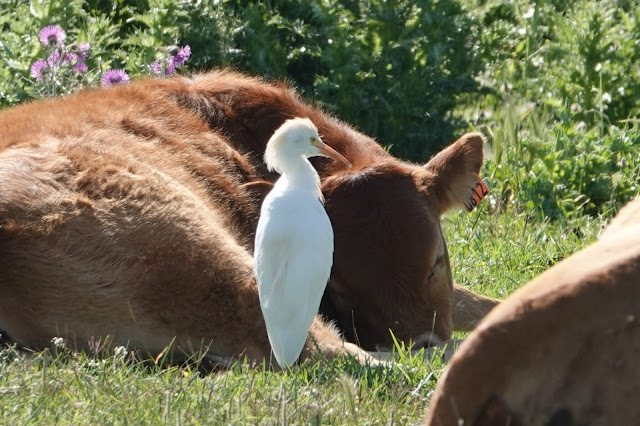 |
| Cattle Egret |
 |
| Prickly Pear |
 |
| micro Mantids |
 |
| micro Mantids |
.JPG) |
| Scolymus hispanicus |
 |
| Solanum linnaeanum |
On towards Barca de Vejer passing a field with quite a few
Northern Bald Ibis in on the way before being greeted by the noisy, active
colony on the low cliffs on the edge of town.
They showed incredibly well and we all got close views of those long
head plumes, oily plumage and beady amber eyes.
There were several nests with chicks in and the colony is going from
strength to strength with sightings regularly from Portugal now. A couple of Jackdaws were a new Corvid for
the group and some of the Rock Doves here looked very good indeed.
 |
| Northern Bald Ibis |
 |
| Rock Dove |
 |
| Jackdaw |
 |
| Andryala integrifolia |
 |
| Solanum bonariense |
Lunch was taken under the trees at Brena de Barbate where
Spotted Flycatchers and Short-toed Treecreepers were almost constantly on
view. Serins jingled from higher up and Sardinian Warblers rattled. It was interesting to see them foraging high
in the pine and eucalyptus canopy. A
couple of invisible Turtle Doves purred and a Hoopoe did the usual now you see
me trick and soon flopped back out of sight.
There were some good insects too with a Two Tailed Pasha
gliding through the trees – what a beast, and a huge Buprestid that initially
landed on my head!
 |
| Buprestid |
 |
| Buprestid |
We continued down into Barbate and moved along the coast
(past the breeding Pallid Swifts) to the town Salinas. It was very hot and open and the heat haze
was slightly problematical but we quickly amassed a good selection of waders
with Kentish and Ringed Plovers, Stilts, Avocets, Dunlin, two Little Stint,
Sanderling, two Curlew Sandpiper, 80 Redshank and 13 Ruff. Adult and fluffy
juvenile Stone Curlews could be seen on one of the islands but it was the
Collared Pratincoles that stole the show putting on a wonderful performance especially
from the van. I do not think I have ever been so close to the species. They were incredibly vocal and we suspected
that they were nesting very close by.
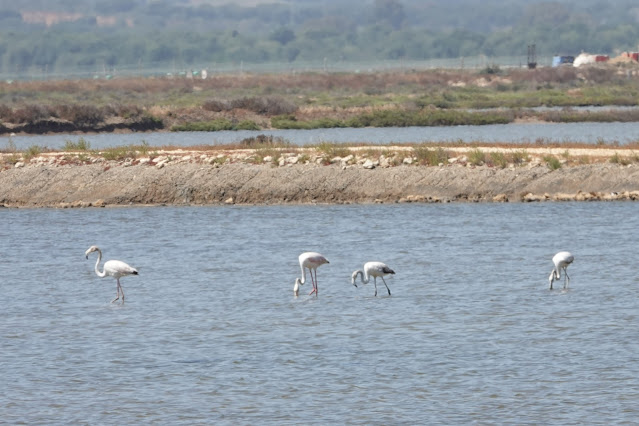 |
| Greater Flamingos |
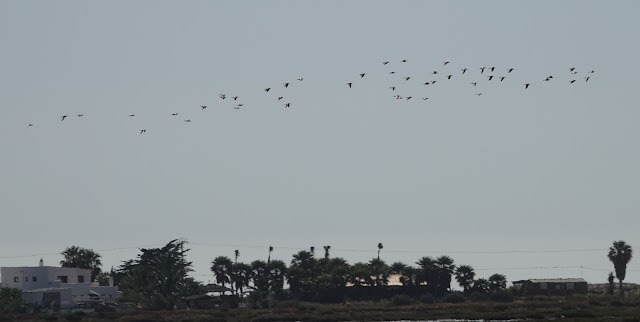 |
| Redshanks |
 |
| Collared Pratincoles |
Short-toed and Crested Larks fed along side the track along
with several foraging Iberian Blue Headed Wagtails while on the rocky slope
beyond came the fizzing notes of many Calandra Larks. Hazy Little Terns escorted us back to the
main road before we journeyed back to Punta Secreta.
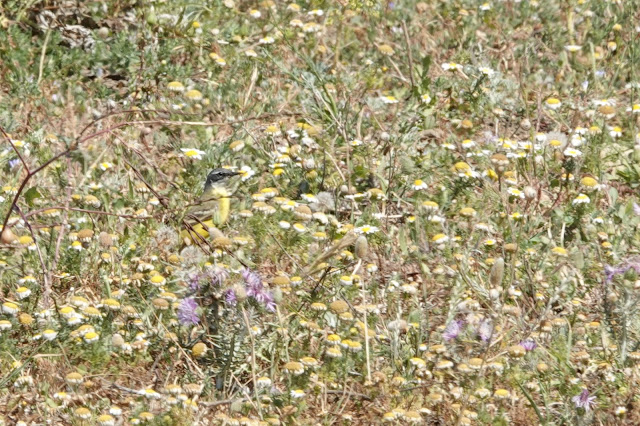 |
| Iberian Blue Headed Wagtail |
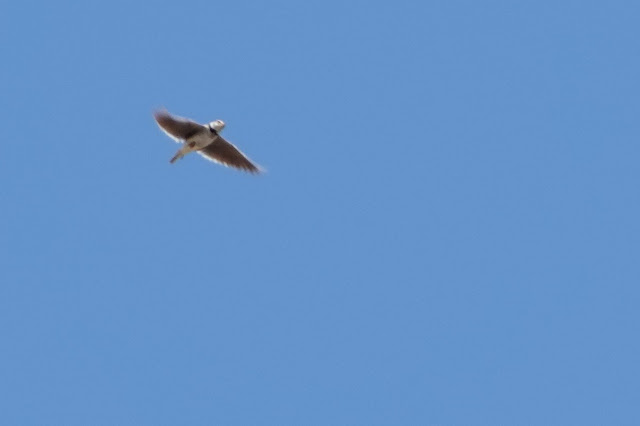 |
| Calandra Lark |
Pre-dinner seawatching once again produced Puffin passage
with 19 heading west along with all three Shearwater species. The Turnstones had increased to 13 and six
Sandwich Terns were patrolling before the fog dramatically came in and
enveloped the whole area obliterating first the Rock, then the large ships,
Morocco and finally our own shoreline.
 |
| Container ship looming out of the fog |














.JPG)




































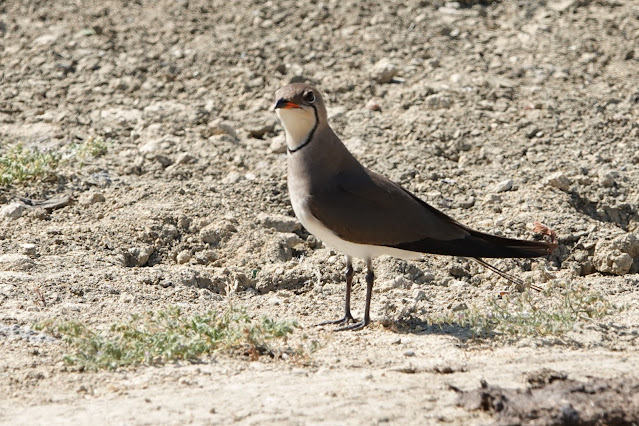

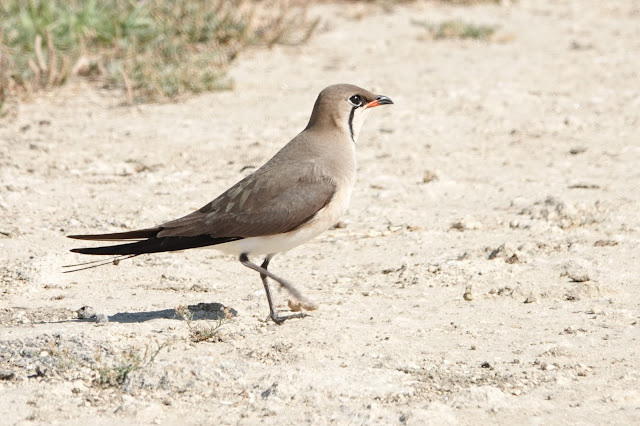




No comments:
Post a Comment